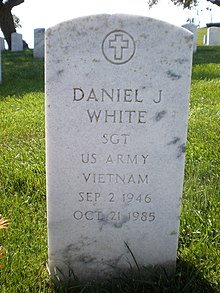Dan White
He grew up in the Visitacion Valley neighborhood of San Francisco and attended Archbishop Riordan High School, until he was expelled for violence in his junior year.
According to a SF Weekly newspaper account, he allegedly quit the force after reporting another officer for beating a handcuffed suspect.
His district was described by The New York Times as "a largely white, middle-class section that is hostile to the growing homosexual community of San Francisco."
The Times stated that as a supervisor, White saw himself as the board's "defender of the home, the family and religious life against homosexuals, pot smokers and cynics".
[2] Despite their personal differences, White and Harvey Milk, who was elected to the San Francisco Board of Supervisors and was the first openly gay officeholder in California history, had several areas of political agreement and initially worked well together.
[2] White also persuaded Dianne Feinstein, then president of the Board of Supervisors, to appoint Milk chairman of the Streets and Transportation Committee.
[2] In April 1978, the Roman Catholic Church proposed a facility in White's district for juvenile offenders who had committed murder, arson, rape and other crimes, to be operated by the Sisters of the Good Shepherd.
[2] Following a disagreement over a proposed drug rehabilitation center in the Mission District, White frequently clashed with Milk, as well as other members of the board.
[7][5] The reasons he cited were his dissatisfaction with what he saw as the corrupt practices of San Francisco politics, as well as the difficulty of earning a living without a police officer's or firefighter's salary, jobs he could not retain legally while serving as a supervisor.
On November 27, 1978, White visited City Hall with the later-declared intention of killing not only Moscone and Milk, but also two other San Francisco politicians, Speaker of the California State Assembly Willie Brown (who himself would later serve as mayor) and Supervisor Carol Ruth Silver, whom he also blamed for lobbying Moscone not to reappoint him.
At trial, White's defense team argued that his mental state at the time of the murders was one of diminished capacity due to depression.
[11] In June 1979, psychiatrist Thomas Szasz, a critic of forensic psychiatry, gave a speech to a large audience in San Francisco calling the verdict a "travesty of justice" which he blamed on the diminished capacity defense.
Fearing he might be murdered in retaliation for his crimes, authorities secretly transported him to Los Angeles, where he served a year's parole.
[17] He was buried at Golden Gate National Cemetery in San Bruno, with a traditional government-furnished headstone issued for war veterans.
[17] The story of the assassinations is told in the Academy Award-winning documentary film The Times of Harvey Milk (1984), which was released a year before White committed suicide.
